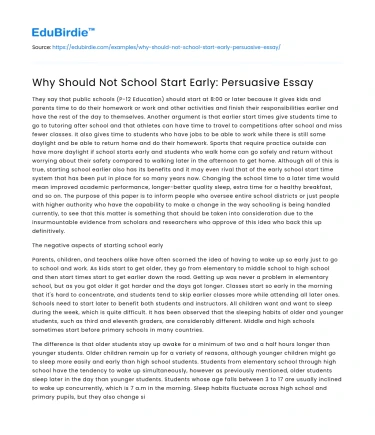They say that public schools (P-12 Education) should start at 8:00 or later because it gives kids and parents time to do their homework or work and other activities and finish their responsibilities earlier and have the rest of the day to themselves. Another argument is that earlier start times give students time to go to tutoring after school and that athletes can have time to travel to competitions after school and miss fewer classes. It also gives time to students who have jobs to be able to work while there is still some daylight and be able to return home and do their homework. Sports that require practice outside can have more daylight if school starts early and students who walk home can go safely and return without worrying about their safety compared to walking later in the afternoon to get home. Although all of this is true, starting school earlier also has its benefits and it may even rival that of the early school start time system that has been put in place for so many years now. Changing the school time to a later time would mean improved academic performance, longer-better quality sleep, extra time for a healthy breakfast, and so on. The purpose of this paper is to inform people who oversee entire school districts or just people with higher authority who have the capability to make a change in the way schooling is being handled currently, to see that this matter is something that should be taken into consideration due to the insurmountable evidence from scholars and researchers who approve of this idea who back this up definitively.
The negative aspects of starting school early
Save your time!
We can take care of your essay
- Proper editing and formatting
- Free revision, title page, and bibliography
- Flexible prices and money-back guarantee
Parents, children, and teachers alike have often scorned the idea of having to wake up so early just to go to school and work. As kids start to get older, they go from elementary to middle school to high school and then start times start to get earlier down the road. Getting up was never a problem in elementary school, but as you got older it got harder and the days got longer. Classes start so early in the morning that it's hard to concentrate, and students tend to skip earlier classes more while attending all later ones. Schools need to start later to benefit both students and instructors. All children want and want to sleep during the week, which is quite difficult. It has been observed that the sleeping habits of older and younger students, such as third and eleventh graders, are considerably different. Middle and high schools sometimes start before primary schools in many countries.
The difference is that older students stay up awake for a minimum of two and a half hours longer than younger students. Older children remain up for a variety of reasons, although younger children might go to sleep more easily and early than high school students. Students from elementary school through high school have the tendency to wake up simultaneously, however as previously mentioned, older students sleep later in the day than younger students. Students whose age falls between 3 to 17 are usually inclined to wake up concurrently, which is 7 a.m in the morning. Sleep habits fluctuate across high school and primary pupils, but they also change significantly between students and teachers. Both students and instructors have difficulty with school hours, and the morning shift has a severe impact on both of their sleep habits. Despite the fact that they are both at school at the same time, their sleeping habits are very different. On weekdays, students and instructors get up early. Students awaken at 6:09 a.m., while teachers awaken at 5:56 a.m. Adolescents and adults require around 9 hours of sleep every day. Because schools begin so early, they are unable to obtain the required eight to nine hours of sleep. Despite the fact that instructors attend school at the same time as students, the repercussions are greater for pupils, and it appears to have a more crucial influence on students. Whether you are a student or a teacher, the quality of your sleep is critical for everyone.
Students must obtain enough sleep in order to focus and get through the academic day. The quantity, consistency, and quality of a student's sleep affect his or her capacity to perform at school. Not only is sleep quality vital for children, but it is also important for instructors. The quality of sleep has an impact on how children and instructors behave during the day. Daytime drowsiness and poor sleep quality on school days in students and instructors may jeopardize academic and occupational performance. Because students and instructors stay up so late at night, they are often exhausted throughout the day. It is necessary to sleep, but it is much more crucial to sleep well. There is no use in sleeping or attempting to sleep if it is not a healthy sleep because students will be weary during the day regardless. While sleep quality is crucial, so is how much sleep a student or teacher gets on school nights. The quantity of sleep that children and instructors are receiving is inadequate, and the reason for this is school. Students are either staying up late completing schoolwork and school-related activities or getting up early to go to school. Sleep is insufficiently obtained by young adolescents.






 Stuck on your essay?
Stuck on your essay?

